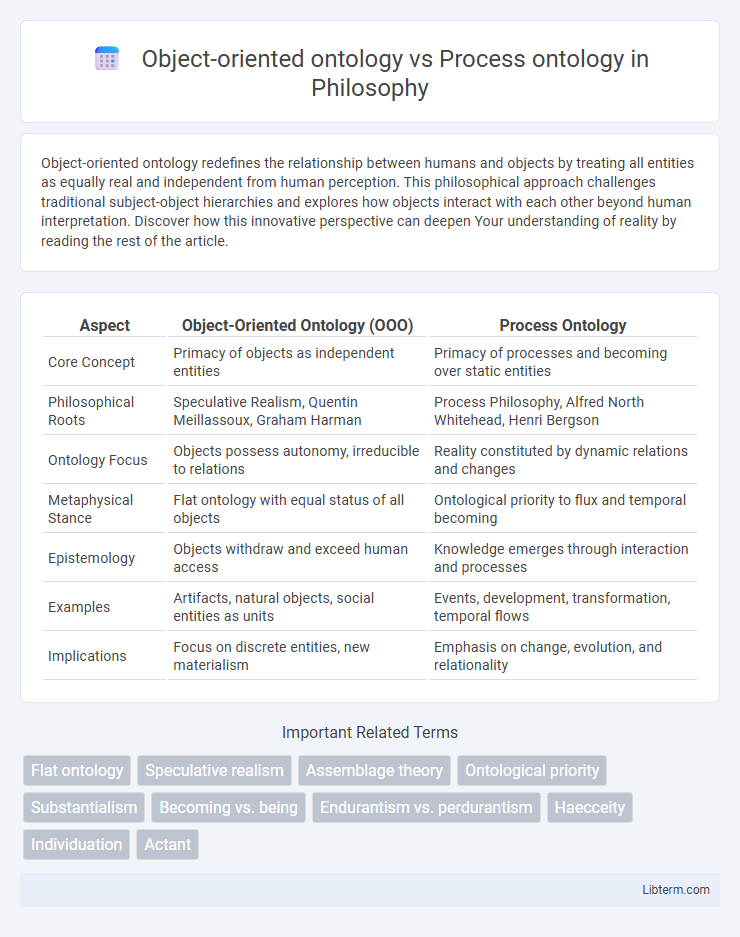Object-oriented ontology redefines the relationship between humans and objects by treating all entities as equally real and independent from human perception. This philosophical approach challenges traditional subject-object hierarchies and explores how objects interact with each other beyond human interpretation. Discover how this innovative perspective can deepen Your understanding of reality by reading the rest of the article.
Table of Comparison
| Aspect | Object-Oriented Ontology (OOO) | Process Ontology |
|---|---|---|
| Core Concept | Primacy of objects as independent entities | Primacy of processes and becoming over static entities |
| Philosophical Roots | Speculative Realism, Quentin Meillassoux, Graham Harman | Process Philosophy, Alfred North Whitehead, Henri Bergson |
| Ontology Focus | Objects possess autonomy, irreducible to relations | Reality constituted by dynamic relations and changes |
| Metaphysical Stance | Flat ontology with equal status of all objects | Ontological priority to flux and temporal becoming |
| Epistemology | Objects withdraw and exceed human access | Knowledge emerges through interaction and processes |
| Examples | Artifacts, natural objects, social entities as units | Events, development, transformation, temporal flows |
| Implications | Focus on discrete entities, new materialism | Emphasis on change, evolution, and relationality |
Introduction to Object-Oriented Ontology and Process Ontology
Object-oriented ontology (OOO) centers on the autonomy and agency of objects, proposing that all entities possess existence and properties independent of human perception. Process ontology emphasizes becoming and change, asserting that reality consists fundamentally of dynamic processes and relations rather than static objects. Both ontologies challenge traditional metaphysics by focusing respectively on discrete entities and their interactions versus continuous flows and transformations.
Defining Key Concepts: Objects and Processes
Object-oriented ontology centers on discrete entities, asserting that objects possess an independent existence with intrinsic properties regardless of human perception. Process ontology emphasizes dynamic becoming, viewing reality as constituted by ongoing processes and interactions rather than static objects. Defining key concepts involves contrasting the object as a stable, self-contained unit with the process as a temporal flow emphasizing relationality and change.
Historical Background and Philosophical Roots
Object-oriented ontology (OOO) traces its origins to the early 21st century, influenced by the speculative realism movement and philosophers like Graham Harman, who emphasized the autonomy and agency of objects beyond human perception. Process ontology, rooted in the work of Alfred North Whitehead in the early 20th century, centers on becoming and change, viewing reality as a series of interconnected events and processes rather than static entities. Philosophically, OOO derives from metaphysical realism and phenomenology, while process ontology is grounded in process philosophy and metaphysical idealism, highlighting dynamic relations over fixed substances.
Core Principles of Object-Oriented Ontology
Object-oriented ontology (OOO) centers on the principle that all objects, whether human or nonhuman, possess equal ontological status and exist independently of human perception. Core principles include the withdrawal of objects, meaning that objects' true being is always partially hidden from interaction, and the flat ontology, which rejects hierarchical privileging of objects. Unlike process ontology, which emphasizes becoming and change, OOO prioritizes static being and the irreducibility of object interactions.
Core Principles of Process Ontology
Process ontology centers on the primacy of becoming and change, emphasizing processes as fundamental entities rather than static objects. It rejects the idea of fixed, enduring substances by focusing on dynamic interactions, temporal flow, and relationality as core principles. This ontology prioritizes events and processes over objects, highlighting continuous transformation and interdependence in the fabric of reality.
Comparing Ontological Approaches: Objects vs Processes
Object-oriented ontology emphasizes the existence and agency of discrete, individual objects independent of human perception, highlighting their intrinsic properties and relations. Process ontology, conversely, focuses on dynamic processes and events as the fundamental constituents of reality, viewing objects as transient manifestations of ongoing activities. This ontological comparison contrasts static entities with fluid occurrences, shaping distinct philosophical frameworks for understanding existence and causality.
Implications for Metaphysics and Epistemology
Object-oriented ontology (OOO) emphasizes the autonomy and reality of objects independent of human perception, reshaping metaphysical discussions by challenging anthropocentric frameworks and promoting a flat ontology where all entities have equal ontological status. Process ontology prioritizes becoming and change over static entities, suggesting metaphysical models centered on dynamic relations and temporal flux, which impacts epistemology by foregrounding knowledge as emergent and context-dependent rather than fixed. These differing ontological commitments influence epistemological approaches: OOO supports the idea that objects withdraw from full human comprehension, limiting epistemic access, while process ontology fosters an understanding of knowledge as inherently partial and evolving with ongoing processes.
Applications in Contemporary Thought and Practice
Object-oriented ontology (OOO) emphasizes the autonomy and equality of all objects, influencing fields like architecture, design, and digital humanities by encouraging non-anthropocentric perspectives and innovative material engagements. Process ontology prioritizes becoming and change, shaping contemporary practices in ecology, social sciences, and organizational theory through a focus on dynamic interactions and relational processes. Both ontologies offer transformative frameworks for understanding complexity and interconnectedness in contemporary thought and practice.
Critiques and Controversies in Ontological Debates
Object-oriented ontology faces criticism for its flat ontology, which some argue neglects the dynamic and relational aspects emphasized by process ontology supporters who prioritize becoming and change over static being. Process ontology critics challenge its emphasis on flux and temporality, claiming it may undermine the stability and identity necessary for objective knowledge and scientific inquiry. Ontological debates thus revolve around tensions between substance-based realism in object-oriented ontology and the emphasis on events and processes in process ontology, highlighting fundamental disagreements about reality's structure and the nature of existence.
Future Directions: Integrating Object-Oriented and Process Perspectives
Future directions in metaphysical research emphasize integrating object-oriented ontology (OOO) and process ontology to overcome limitations inherent in each framework. Combining OOO's focus on discrete, autonomous entities with process ontology's emphasis on relational becoming can foster a more holistic understanding of reality that captures both stability and change. Emerging interdisciplinary approaches leverage this integration to enhance technological modeling, ecological analysis, and social theory, promoting dynamic yet structured conceptualizations of existence.
Object-oriented ontology Infographic

 libterm.com
libterm.com